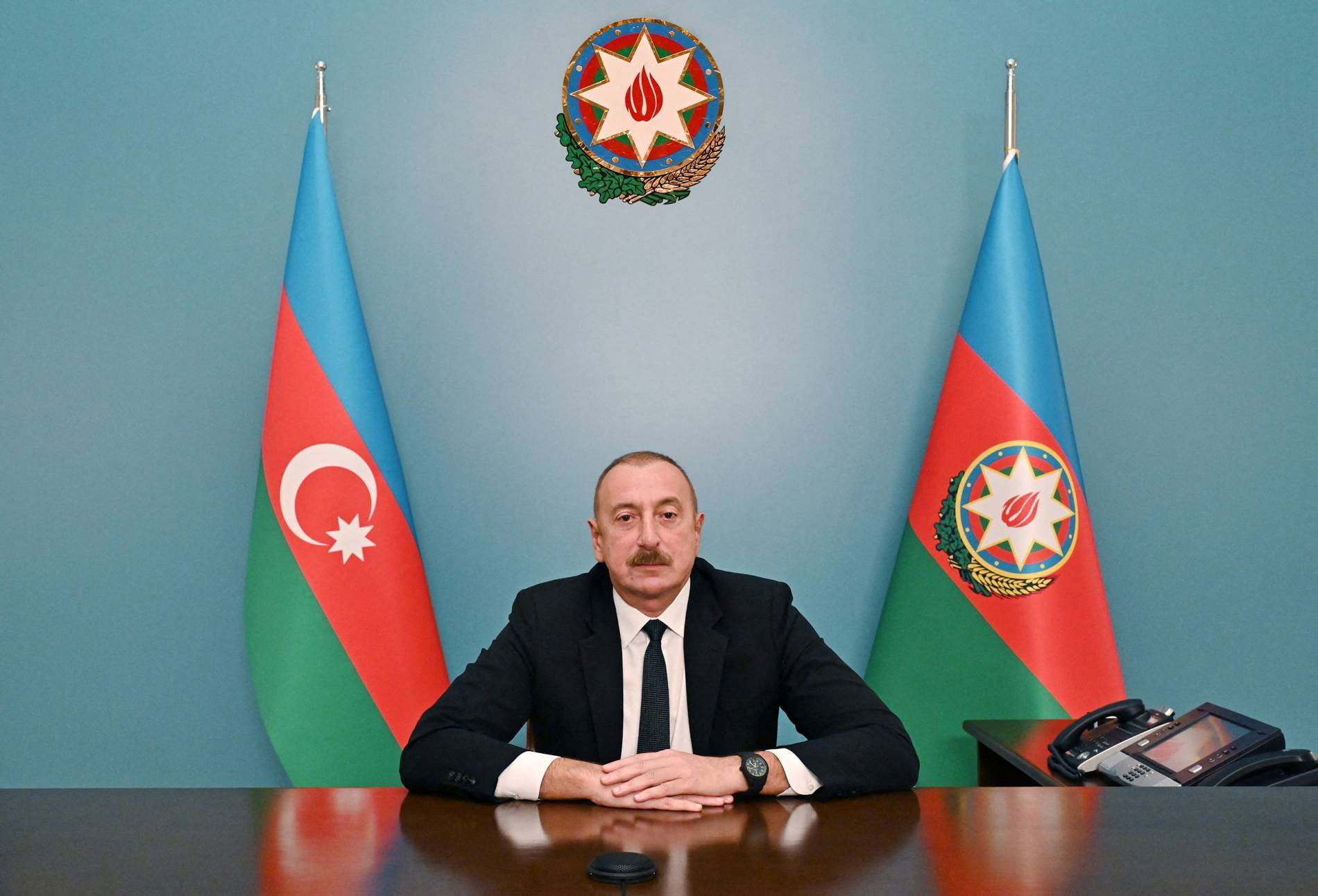
Azerbaijani President Ilham Aliyev delivers a televised address to the nation in Baku, Azerbaijan, September 20, 2023. Press Service of the President of Azerbaijan Ilham Aliyev/Handout via REUTERS/File Photo Acquire Licensing Rights
Oct 4 (Reuters) – Azerbaijan’s President Ilham Aliyev on Wednesday pulled out of an EU-brokered meeting with Armenian Prime Minister Nikol Pashinyan, dealing a blow to prospects for rescuing the peace process between the two countries.
The meeting had been aimed at preventing any further escalation and restoring dialogue after Azerbaijan last month seized back control of a region populated by ethnic Armenians, prompting more than 100,000 of them to flee to Armenia.
Pashinyan, in need of support to tackle the resulting humanitarian crisis and shore up his embattled leadership, said he would still attend Thursday’s talks in Spain with EU Council President Charles Michel and the leaders of France and Germany.
But Azerbaijan’s state-run APA news agency, citing unnamed sources, said Aliyev had decided not to go.
It said Aliyev had wanted his ally Turkey to be represented at the meeting, but that France and Germany had objected, and said that Baku felt “an anti-Azerbaijani atmosphere” had developed among the meeting’s potential participants.
A source in Aliyev’s administration confirmed to Reuters that the president would not go, but said he was prepared to talk instead in a three-way format with Pashinyan and the EU’s Michel.
Aliyev’s forces mounted a lightning offensive last month to retake control of Azerbaijan’s Nagorno-Karabakh region, whose ethnic Armenian population had broken away in a war in the 1990s. Aliyev said his “iron fist” had restored his country’s sovereignty.
Karabakh has been the focus of two wars between Armenia and Azerbaijan in the past 30 years and they have yet to seal a peace treaty, a task made more urgent by the latest crisis.
SETBACK
Olesya Vartanyan, South Caucasus analyst at the non-profit International Crisis Group which works to defuse global conflicts, said Aliyev’s no-show was a big setback.
“It was very important for him to come, after this military operation in Nagorno-Karabakh, to recommit to the (peace) process with the mediation of the European Union and the United States,” she said.
Vartanyan said advisers to Pashinyan and Aliyev had met French, German and EU officials in Brussels last week to prepare for the talks in Spain and avoid surprises or misunderstandings.
She said experience had shown that the chances of clashes on the ground were higher at moments when the two sides stopped talking. Outstanding bilateral issues include how to define their shared border and reopen transport links that have been severed by decades of conflict.
Azerbaijan’s APA agency said Aliyev’s decision not to attend was partly prompted by “pro-Armenian statements” by French officials and France’s decision, announced on Tuesday, to supply Yerevan with military equipment.
Azerbaijan’s foreign ministry also condemned what it said were unfounded comments on Wednesday by French Foreign Minister Catherine Colonna.
Colonna told a parliamentary hearing that France was not looking to escalate the crisis, but that it was normal to continue defensive weapons sales to Yerevan when “Azerbaijan has never stopped arming itself to carry out offensive actions”.
The EU must send a clear signal that any threats to Armenia’s territorial integrity are unacceptable, said Colonna, who visited Pashinyan on Tuesday.
“I repeat, any action in this direction would give rise to robust reactions,” she said.
APA said Azerbaijan would not attend any future talks that included France.
Omer Celik, spokesman for Turkish President Tayyip Erdogan’s ruling AK Party, backed Aliyev’s decision to shun the talks.
“Mr Aliyev cancelled his Spain visit because the condition of Turkey’s participation was not accepted. We admire this,” he said.
U.S. Senator Ben Cardin, chairman of the Foreign Relations Committee, said Washington should withhold security assistance to Azerbaijan and hold it accountable for what he called its “coordinated, intentional campaign of ethnic cleansing” in Nagorno-Karabakh.
Azerbaijan denies ethnic cleansing, saying the Armenians were not forced to leave and would enjoy full civic rights if they stayed. But many of those who fled said they did not trust that promise, given the bloody history between the two peoples.
Additional reporting by Nailia Bagirova, Andrew Osborn, John Irish, Tuvan Gumrukcu, Doina Chacu and Paul Grant; writing by Mark Trevelyan
Editing by Gareth Jones
私たちの行動規範:トムソン・ロイター「信頼の原則」
Chief writer on Russia and CIS. Worked as a journalist on 7 continents and reported from 40+ countries, with postings in London, Wellington, Brussels, Warsaw, Moscow and Berlin. Covered the break-up of the Soviet Union in the 1990s. Security correspondent from 2003 to 2008. Speaks French, Russian and (rusty) German and Polish.
